
Annales Mathematiques du Quebec
Scope & Guideline
Fostering Collaboration in Mathematical Research
Introduction
Aims and Scopes
- Iwasawa Theory:
A core area of focus, examining the properties and applications of Iwasawa modules, p-adic L-functions, and their invariants across different mathematical contexts. - Eigenvalue Problems:
The journal frequently publishes research on eigenvalues, particularly Steklov eigenvalues, exploring their bounds, growth rates, and implications in geometric analysis. - Modular Forms and Galois Representations:
There is a consistent emphasis on the study of modular forms, Galois representations, and their connections to number theory, particularly through the lens of Iwasawa theory. - Geometric Analysis:
Many articles address geometric structures, including the study of manifolds, metrics, and curvature, contributing to the field of geometric analysis and differential geometry. - Algebraic Geometry and Number Theory:
The journal encompasses research in algebraic geometry and number theory, often focusing on elliptic curves, abelian varieties, and their arithmetic properties. - Dynamical Systems:
The exploration of dynamical systems, particularly on surfaces and in relation to symplectic geometry, is also a notable area of interest.
Trending and Emerging
- p-adic Analysis:
There is an increasing emphasis on p-adic analysis, particularly in the context of L-functions, Heegner cycles, and their applications to number theory, highlighting a resurgence of interest in this foundational area. - Geometric and Spectral Analysis:
Recent papers increasingly focus on spectral properties of various geometric structures, including the analysis of eigenfunctions and their asymptotic behavior, indicating a growing interest in the interplay between geometry and analysis. - Higher Codimension and Stability Results:
Research on higher codimension phenomena and stability results, particularly in the context of the positive mass theorem and asymptotic flatness, reflects an emerging trend towards understanding complex geometric and topological properties. - Moduli Spaces and Classification Problems:
There is a rising interest in the classification of moduli spaces, especially in relation to modular forms and their representations, suggesting a shift towards more abstract and higher-dimensional mathematical theories. - Dynamics on Manifolds:
The exploration of dynamical systems on various manifolds has gained prominence, with a focus on symplectic structures and their applications, indicating an evolving interest in dynamical behavior within geometric frameworks.
Declining or Waning
- Fluid Dynamics:
Research related to fluid dynamics, particularly on incompressible motions in porous media, has seen a noticeable decrease in recent issues, indicating a waning interest in this subfield. - Quantum Mechanics and Physics:
Topics intersecting mathematics with quantum mechanics, such as quantum ergodicity and the Maxwell-Schrodinger equations, appear less frequently, suggesting a shift away from this interdisciplinary focus. - Combinatorial Geometry:
Despite earlier publications in this area, the frequency of papers focusing on combinatorial aspects of geometry has diminished, possibly reflecting a broader trend in mathematical research interests.
Similar Journals

Forum of Mathematics Sigma
Advancing mathematical frontiers for a global audience.Forum of Mathematics Sigma is a premier open access journal published by Cambridge University Press that has been at the forefront of mathematical research since its inception in 2013. With a strong emphasis on advancing the fields of mathematics, the journal consistently achieves Q1 rankings across multiple categories, including Algebra and Number Theory, Analysis, and Computational Mathematics. This distinction highlights its impact and relevance within the scholarly community. The journal prides itself on providing a platform for innovative research, fostering collaboration among researchers and practitioners across various mathematical disciplines. Open access publication ensures that cutting-edge findings are widely available to readers globally, enhancing the dissemination of knowledge. With an address in the heart of Cambridge, England, Forum of Mathematics Sigma is dedicated to promoting high-quality research and making significant contributions to the development of mathematics.
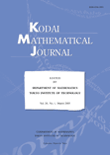
Kodai Mathematical Journal
Illuminating the Path of Mathematical DiscoveryKodai Mathematical Journal is a distinguished publication dedicated to advancing the field of mathematics, particularly in miscellaneous areas. Established in 1949, this esteemed journal has been a reputable source for researchers and practitioners who seek to contribute to the rich landscape of mathematical knowledge. Published by KINOKUNIYA CO LTD, the journal is based in the academic environment of Tokyo Institute of Technology and serves a global audience with rigorous and insightful research articles. Despite its current Q3 quartile ranking in the Scopus Mathematics category, which reflects its niche but impactful contributions, the journal is poised for growth; the convergence of traditional and novel mathematical techniques promises to enhance its relevance further. Researchers, professionals, and students are encouraged to engage with the rich content of the journal, aimed at fostering collaboration and nurturing innovation in the mathematical community. While currently not available as Open Access, Kodai Mathematical Journal remains a critical resource for those passionate about mathematics and its applications.

Documenta Mathematica
Pioneering Insights in Mathematics Since 1996Documenta Mathematica is a premier academic journal published by the European Mathematical Society (EMS), making significant contributions to the field of mathematics since its inception. With an Open Access model established in 1996, the journal ensures that scholarly works are freely available to a global audience, promoting widespread dissemination of mathematical research. Based in Germany, it serves as a vital platform for mathematicians, covering a wide array of topics within the discipline, evidenced by its impressive Q1 ranking in the miscellaneous category of mathematics as of 2023. Featuring rigorous peer-reviewed articles that span the latest trends and breakthroughs in the discipline, Documenta Mathematica also retains a commendable position among its peers with a Scopus rank of 163 out of 399, placing it in the 59th percentile for general mathematics. Researchers, professionals, and students alike will benefit from the robust scholarly content and the journal's commitment to advancing mathematical knowledge.

Journal of the Ramanujan Mathematical Society
Elevating the Standards of Mathematical ScholarshipJournal of the Ramanujan Mathematical Society, published by the esteemed Ramanujan Mathematical Society, serves as a vital resource for researchers and professionals in the field of mathematics. With an ISSN of 0970-1249 and an E-ISSN of 2320-3110, this journal specializes in disseminating high-quality research and advancements in various domains of mathematics, particularly those that echo the legacy of the renowned mathematician Srinivasa Ramanujan. Since its inception in 2006, this journal has evolved to embrace a diverse range of mathematical topics, striving for excellence as evidenced by its current Q3 ranking in the mathematics (miscellaneous) category for 2023. Although it is not an open-access journal, the Journal of the Ramanujan Mathematical Society remains a cornerstone for those engaged in the academic study of mathematics, as it appears in Scopus with a rank of #343/399. As it continues its publication journey towards 2024, the journal aims to foster a vibrant community of scholars and practitioners who contribute to the evolving landscape of mathematical research.

Revista Matematica Complutense
Championing High-Impact Research in MathematicsRevista Matematica Complutense is a prestigious peer-reviewed journal published by SPRINGER-VERLAG ITALIA SRL, specializing in the field of mathematics. With its ISSN 1139-1138 and E-ISSN 1988-2807, the journal plays a vital role in disseminating high-quality research and fostering academic discussion within the mathematics community. Recognized for its rigorous selection process, the journal has achieved impressive rankings, holding a Q1 quartile status in the miscellaneous mathematics category as of 2023 and ranking #94 out of 399 in general mathematics according to Scopus, placing it within the 76th percentile. With a publication timeline spanning from 2008 to 2024, the Revista Matematica Complutense continues to serve as an essential resource for researchers, professionals, and students alike. Although it does not currently offer open access, the journal remains committed to advancing mathematical knowledge and providing a platform for innovative research across various mathematical disciplines.
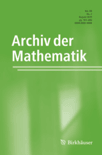
ARCHIV DER MATHEMATIK
Shaping the Future of Mathematics with Every PublicationARCHIV DER MATHEMATIK is a distinguished journal published by SPRINGER BASEL AG, renowned for its contributions to the field of mathematics. Established in 1948 and continuing its legacy through to 2024, the journal provides a platform for innovative research and scholarly articles that push the boundaries of mathematical theory and application. With an ISSN of 0003-889X and an E-ISSN of 1420-8938, it holds a reputable position within the academic community, reflected by its Q2 ranking in the 2023 Mathematics (Miscellaneous) category. Despite not being an open access publication, ARCHIV DER MATHEMATIK remains accessible to a global audience through various databases, ensuring the dissemination of high-quality research. The journal’s commitment to enhancing mathematical discourse makes it an essential resource for researchers, professionals, and students seeking to expand their understanding of this vital discipline.

Research in Number Theory
Unveiling the mysteries of numbers through rigorous research.Research in Number Theory is a prestigious journal eagerly embraced by the mathematical community, focusing on the intricate and profound aspects of algebra and number theory. Published by Springer International Publishing AG, the journal showcases cutting-edge research from 2015 to 2024, making it a pivotal platform for advancing knowledge in its field. With its ISSN 2522-0160 and E-ISSN 2363-9555, this journal holds a commendable position in the academic ecosystem, as evidenced by its ranking in the Q2 quartile for the category of Algebra and Number Theory in 2023. Despite being positioned within a competitive percentile, this journal aims to foster innovation and discovery, providing researchers, professionals, and students with valuable insights into the ever-evolving landscape of number theory. While the journal currently operates under a traditional publishing model, it is committed to disseminating high-quality, impactful research that propels the discipline forward. Join the conversation and contribute your work to a publication that is at the forefront of mathematical discovery.
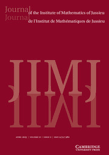
Journal of the Institute of Mathematics of Jussieu
Fostering Collaboration for Tomorrow's Mathematical BreakthroughsJournal of the Institute of Mathematics of Jussieu, published by Cambridge University Press, is a leading academic journal that has established itself as a vital resource in the field of mathematics. With an impressive impact factor and a ranking in the top quartile (Q1) of miscellaneous mathematics, the journal serves as a platform for high-quality research from both established scholars and emerging researchers. Spanning from 2002 to 2024, the journal aims to foster collaboration and innovation in the mathematical community by publishing original research articles, reviews, and critical discussions on a wide range of mathematical topics. Although the journal does not offer open access, it remains widely accessible through various academic institutions and libraries, ensuring that critical advancements in mathematics are shared with a global audience. Located in the United Kingdom at the prestigious Cambridge campus, the journal reflects the rigorous standards of its publisher and the rich academic tradition of its home institution.
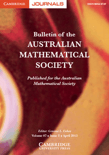
BULLETIN OF THE AUSTRALIAN MATHEMATICAL SOCIETY
Empowering the Mathematical Community Through KnowledgeBULLETIN OF THE AUSTRALIAN MATHEMATICAL SOCIETY is an esteemed journal dedicated to advancing the field of mathematics, published by Cambridge University Press. Since its inception in 1969, this periodical has fostered scholarly communication and showcased pivotal research in various domains of mathematics, now projected to continue until 2024. With an impact factor that places it in the Q2 category of miscellaneous mathematics research, it holds a notable position among its peers, ranking 215th out of 399 in the Scopus database. Though it does not currently offer open access options, the journal remains a vital resource for researchers, professionals, and students seeking to deepen their understanding of mathematical advancements. The Bulletin serves as a crucial platform for disseminating original research, comprehensive reviews, and insightful perspectives that navigate the complexities of mathematics today, ensuring the community is well-informed and engaged.
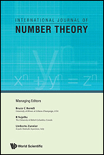
International Journal of Number Theory
Cultivating Knowledge in Algebra and Number TheoryInternational Journal of Number Theory is a prestigious scholarly publication dedicated to advancing the field of mathematical research, particularly in algebra and number theory. Published by WORLD SCIENTIFIC PUBL CO PTE LTD and situated in Singapore, this journal boasts an impressive reputation, holding a Q2 quartile ranking in its category for 2023. With a commitment to disseminating peer-reviewed research, the journal features works that explore both foundational and contemporary issues related to number theory, making it an essential resource for mathematicians, researchers, and students alike. Spanning from 2008 to 2024, the journal embraces a wide range of topics within the discipline, promoting innovative ideas and fostering academic discourse. Although it does not currently offer open access options, its rigorous selection process ensures that published articles maintain high standards of quality and impact, contributing significantly to the global mathematics community.